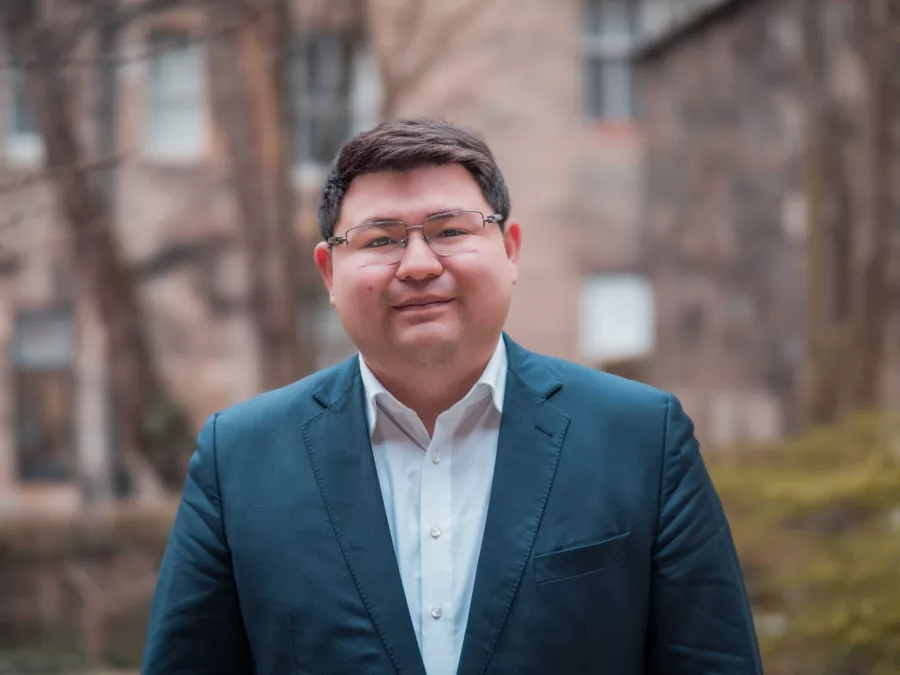Kazakhstan: the economy needs people with relevant skills

Economist Adil Kusmanov believes human capital development is central to diversifying and transforming the economy. He brings this perspective to the Bolashak Centre, Kazakhstan’s prestigious international scholarship programme.
Adil is the new chairman of the Centre for International Programs “Bolashak,” which he describes as “one of the biggest social lifts in Kazakhstan.” The programme, which has been running for 31 years, has supported about 13,000 Kazakh students to study at the top universities in the world, including the prestigious Oxford, Cambridge, Harvard and Stanford.
“We now send about 900 people to study for master’s, PhDs and internship programmes annually,” Adil explains. “They are required to return and work in Kazakhstan in their specialism for five years.”
Adil participated in our 2023/2024 Wider Europe and Central Asia fellowship programme while working at the Economic Research Institute, part of Kazakhstan’s Ministry of National Economy. He brings a big-picture view of economic and social development to his new role.
Economic contribution
“Human capital is a crucial part of economic policy,” he says. “It was a challenge that my predecessors were people predominantly from the education field. I believe the Government and Ministry decided to bring me in, as a person with an economic policy background, to align the programme with the economy’s and labour market’s needs.”
Adil also has a personal reason for his commitment to the role. As a Bolashak scholar, he earned a master’s degree in mathematical modelling and scientific computing from the University of Oxford. “The government invested in me a lot, and I want to give back,” he says.
Adil’s top priority in his new role is aligning the programme with the demands of the economy and labour market. “It should be skills-based,” he says. We need people to specialise in areas in high demand in Kazakhstan and gain skills that are most valuable to the economy. We want these people to come back and make a positive economic contribution to our country. It’s something I believe in, which makes me very, very motivated.”
Tax policy reform
When Adil took part in our fellowship programme, he was still working in his previous role as deputy chairman of the Economic Research Institute, where he worked on national economic policy. His John Smith Trust action plan focused on researching and making policy recommendations that could increase Kazakhstan’s tax revenues, reduce its budget deficit, and improve its economic sustainability.
Adil wanted to understand how tax policy works in the UK and research possible reforms in corporate tax, value-added tax (VAT), and personal income tax. During the residential part of his fellowship, he met with senior economists and academics in England and Scotland.
“All the meetings were beneficial, but the two most beneficial to me were with Gary Gillespie, chief economic advisor to the Scottish Government, and David Phillips from the Institute for Fiscal Studies,” he says.
Corporate tax and VAT
During the meeting with Gary Gillespie, Adil was interested to see how taxes are distributed in the UK and the degree of autonomy Scotland has in raising taxation. “For example, part of the corporate income tax and VAT go to the central UK government. But personal income tax goes directly to Scotland,” he says.
Before his fellowship, Adil considered different corporate income tax rates for various industries. “In the UK, I learned this is not a good idea,” he says. “David Phillips shared some ideas about VAT and how to differentiate it because it’s not a direct tax. Whereas corporate tax is paid from revenues and should be a flat rate tax for almost all industries.”
When Adil returned to Kazakhstan, he shared these ideas with government colleagues. “I suggested we keep the 20% corporate income tax rate,” he says. For VAT, the consensus is that agriculture is a socially significant field, so it should have a lower VAT rate of 6-8%. The rate for other industries will probably be 16%.”
Personal income tax and Increasing tax revenues
In Kazakhstan, personal income tax comprises about 12% of tax revenues, compared to around 30-40% in the UK and OECD countries. Adil says: “As a part of my action plan, I discussed the possibility of differentiating personal income tax in Kazakhstan. The consensus is that we should keep the current 10% rate, increasing it to 15% for high-income people.
“We also discussed how digitalisation can help collect taxes from big and medium businesses. For example, when a business is split into three or four entities, digitalisation can connect them and treat them as one company for tax purposes.
“This reform is important because it could help increase tax revenues from around 18% of GDP to 22-23% of GDP per year. The goal is to increase it up to at least 25%, and I think it’s possible.”
Making connections
In addition to gaining insights on which to base policy recommendations, Adil values the connections he made during his fellowship. He has stayed in contact with people from his cohort and visited Fellows in Kyrgyzstan and Tajikistan.
He adds: “I also met a new UK Trade Envoy for Kazakhstan, Lord John Alderdice, so this networking was crucial. It was also valuable to meet my peers from across the region, including Ukraine, and hear their perspectives on the war.
“The great thing is this long-standing network brings together professionals from different fields to interact and listen to each other. Regional cooperation is important – and bridges are formed from people in the network.”
Find out more about our fellowship programmes
